Cambodia is our second country guide here on NomadTalk but our first love. We’ve spent more than four years in Cambodia in our time in South East Asia and there’s no doubt in our minds – if you want to find freedom as a digital nomad, Cambodia is the place to do it.
Cambodia is not Thailand. It is a developing nation and until recently was one of the world’s officially poorest nations. The cost of living, overall, is very low with a favorable tax regime on most imported products too but housing on a like-for-like basis is much more affordable in Thailand. Internet is excellent in Cambodia and there are plenty of co-working spaces in the nation’s most popular cities. Cambodia is a great place for the digital nomad looking to truly spread their wings.
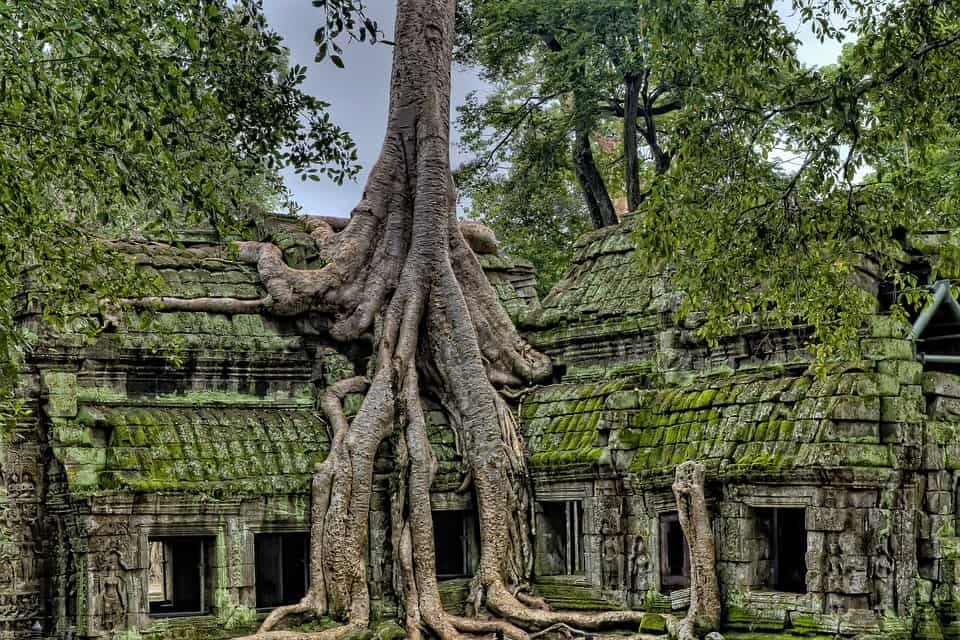
Table of Contents
About This Guide
It’s important for us to point out at this point that this guide is not a city guide. We review each city that we’ve spent time in, separately. This is more to explain what you can expect from living and working in Cambodia on a more general basis.
This guide is split into a bunch of different sections that are designed to address specific concerns of some nomads. If you feel that a section is not for you, just skip it and move on.
Cambodia: A Wild West Destination For Digital Nomads?
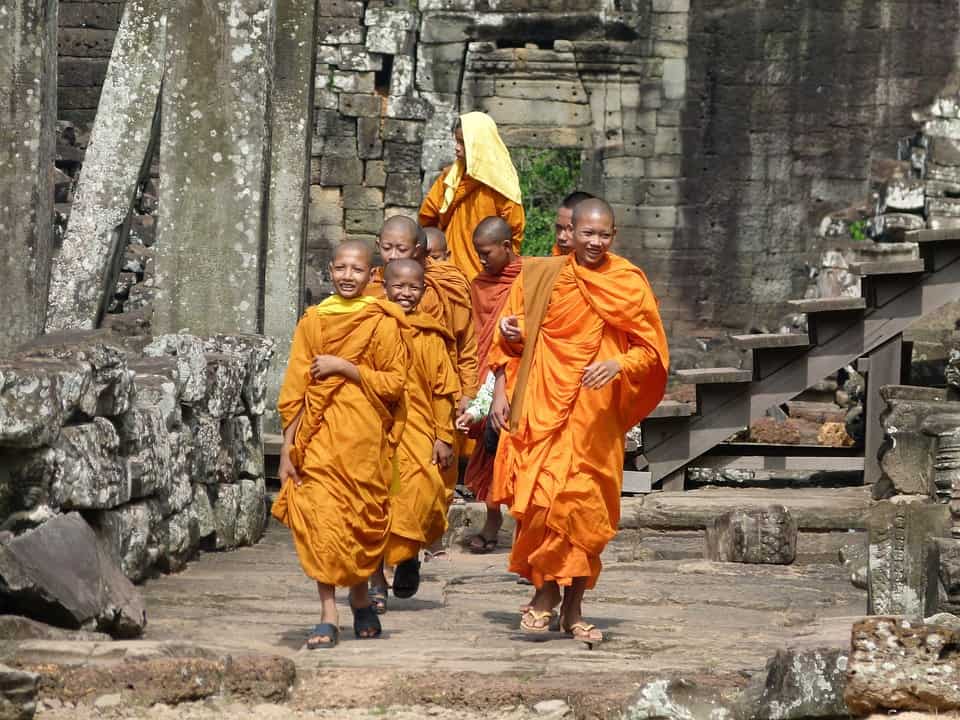
It is fair to say that Cambodia is something of an acquired taste. People either seem to love it or hate it. We suspect that many people pass through too quickly on their way from Thailand to get to grips with the basic fact: Cambodia is not Thailand.
It’s a country which has recently seen one of the worst horrors in human history in a self-perpetuated genocide masterminded by Pol Pot and the Khmer Rouge. The shadow of this history hangs over a people who are, normally, kind, friendly and genuinely happy to see you.
The nation’s biggest tourist destination, Angkor Wat, heads up countless “Top 100 places to see before you die” lists and even more individual bucket lists. The Cambodian tourism authority, however, has yet to really get to grips with marketing Cambodia effectively and it’s still a relatively untraveled country from a Western perspective.
There are two functioning airports in Cambodia – one in Phnom Penh, that nation’s capital, and one in Siem Reap the home of Angkor Wat. Oddly, Battambang the 2nd biggest city in the country is still without air service and the spotty air service into Sihanoukville (when/if there is a service at all) in the South is straight-up dangerous.
Cambodia’s status as a developing nation is very clear. There is garbage strewn along the streets (when it’s not being set fire to at night), medical services are rudimentary, many other services are poor to non-existent.
On the positive side of this, it’s cheap, really cheap to live in. Alcohol, eating out, cigarettes, etc. are very low cost. Phone services and Internet services are also next to nothing in the scheme of things. However, it’s worth noting (again) that accommodation is more expensive if you want something similar to what you can get in Thailand and electricity is also very expensive.
By and large, Cambodia is a safe place to be, but pretty crime abounds and you should always be careful with belongings both when wandering about and when leaving your home unattended.
Yes, it does have something of the Wild West about it but it’s nothing like Deadwood, either.
We’ve always found, though, that the positives far outweigh the negatives where Cambodia is concerned. It is much easier to meet people and make friends in the communities of Cambodia than it is in many other destinations in South East Asia. We love the place.
What Do You Want From Cambodia?
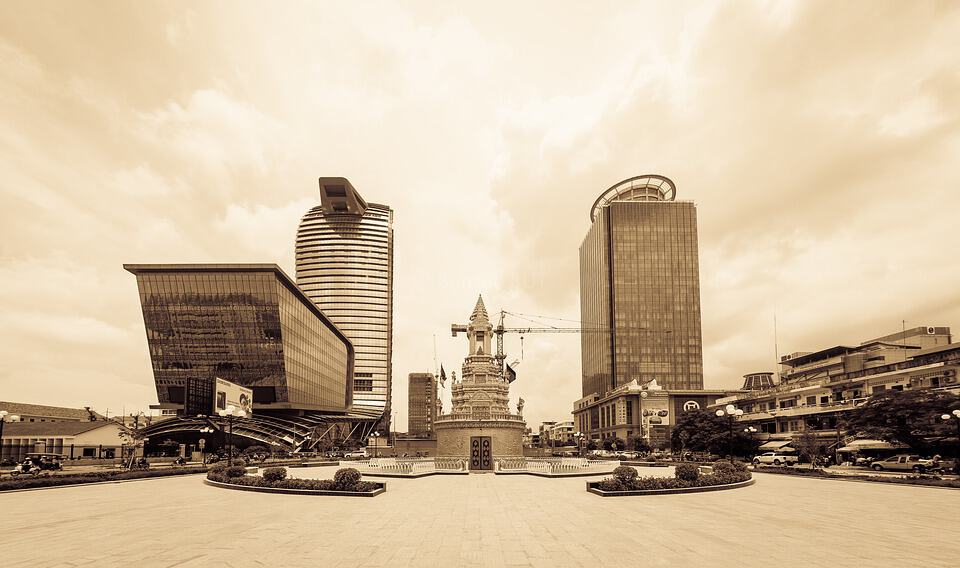
We’ll have city guides for the major destinations in Cambodia coming very soon but there are definitely fewer options than Thailand for all but the most adventurous of travelers.
Travelers to Cambodia used to opt for Siem Reap, Phnom Penh or the beach town of Sihanoukville. Sihanoukville, in recent years, has undergone a major economic boom at the hands of the Chinese investors in the region. It is now extremely expensive and most Western-style businesses are long gone. The beaches were never all that great in the first place.
Now, instead of Sihanoukville, people who want to avoid the three big cities (yes, even Battambang is getting more popular now) tend to head to the sleepy beach resort of Kep or the hippy-esque riverside community of Kampot.
Siem Reap, where we’ve spent most of our time in Cambodia, is the doorway to Angkor Wat, it also has a ton of tourist activity and plenty of pubs, bars, restaurants to cater to them. It doesn’t have much late nightlife though and while prostitution exists in Siem Reap, it’s not an industry like it is in Phnom Penh or Bangkok.
Phnom Penh has also seen a huge influx of Chinese money and the “Pearl of the Orient” is developing rapidly. This means rising rents but also a huge improvement in facilities. It also offers plenty of places to eat and drink with a solid nightlife. Its “red light” activities are spread out more evenly than in Bangkok.
Battambang is a sleepy riverside town and likely to stay that way. It’s where the best Khmer is spoken and where most of the real work gets done. It’s pretty, quiet and unassuming and we like it that way.
The banks of the river in Kampot are now surrounded by cheap guesthouses where local marijuana is often involved in the meal of the day. It’s the perfect place to “get away from it all” but in company. Those, who live there wouldn’t change it for the world.
Kep is possibly the sleepiest place in Cambodia. For us, it’s good for a few days to recharge your batteries in solitude and while it is becoming more popular, we wouldn’t want to live there.
The rest of the country is basic and likely to stay that way. That’s not to say there aren’t intrepid travelers hanging out in Mondulkiri or Ratanakiri but it is to say that a lack of Internet services and even slightly reliable electricity is likely to mean that digital nomads go for a couple of days to see them rather than moving in.
The country has outstandingly beautiful national parks that barely any tourist visits and even when it comes to Cambodia’s heritage – spectacular wonders such as Koh Ker, Preah Vihear, and Sambor Prei Kuk (to name but a few) barely see any real footfall. If you want to go off the beaten track to explore, we reckon Cambodia’s the best place in the region for it.
Getting Into Cambodia – Visas And Other Stuff
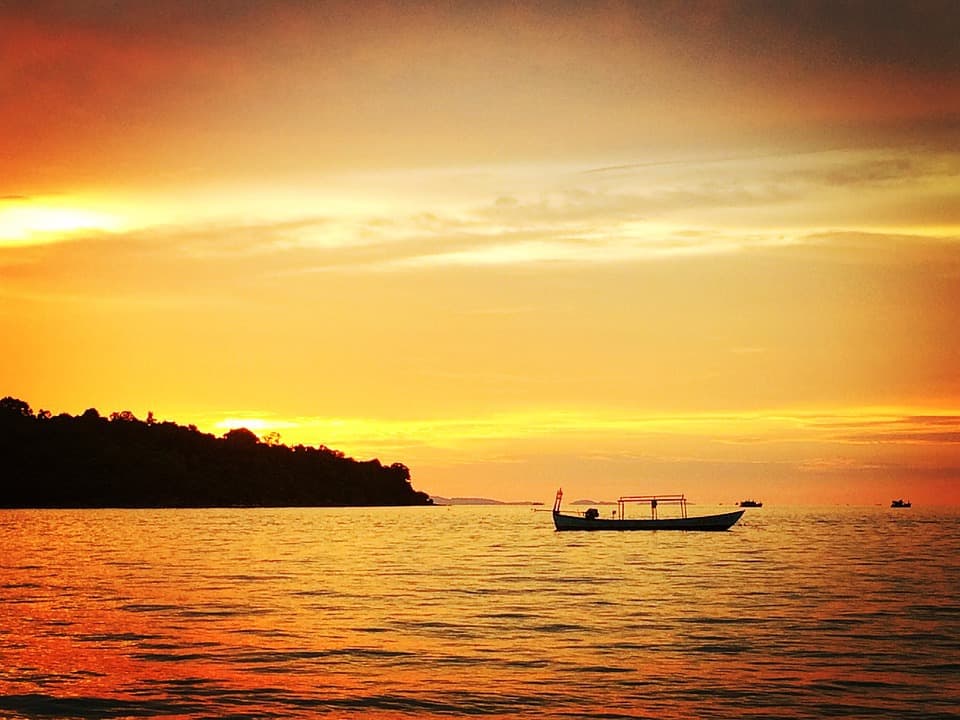
Getting into Cambodia as a tourist is spectacularly easy for almost everyone. There are a handful of African nationals who need to apply for visas in advance. Everyone else can buy a visa on arrival (or if they’re from an ASEAN nation – they may qualify for a short visa-exempt stay).
There is absolutely no need to buy a Cambodian Visa in advance. Even at the busiest borders, it takes only a few minutes to get a visa from Cambodian immigration.
However, from experience – make sure you have photocopies of your passport, passport photos, a pen (to fill in any forms) and the right money in USD for the visa that you want to buy. Cambodian immigration staff make awful salaries and the easiest way to supplement these salaries is by extorting a dollar or two from an unprepared tourist.
Please note: extortion from Cambodian officials is almost always petty. A couple of bucks that is, genuinely, purely optional and which will be appreciated if you hand it over but feel free to say “no”, it won’t get you into any trouble.
Unlike some other countries in the region – you do not need to provide onward flights, hotel bookings, etc. when arriving in Cambodia (though some airlines may require proof of onward flights before allowing you to board the plane).
If you have the money to pay for your visa – Cambodia welcomes you. It’s that simple.
There are two visa types you can buy on arrival in Cambodia:
- A one-month tourist visa. If you land at Siem Reap airport you must stay in the country for 24 hours on this visa, otherwise, you can leave immediately if you want. The cost of this visa is currently $30 and if you want to stay in Cambodia for longer than a month – you can get a single one-month extension for $45 but after that, you must leave the country.
- A one month E-class visa (an “ordinary” visa but often mistaken for a “business “ visa) this costs $35 and may be extended in-country, in various intervals, but not as easily as it once was. See our article on Cambodian E-Class Visas for more information.
There are other visas for Cambodia but if you were to qualify for them, you’d already know about them. Almost all digital nomads, other than those of Khmer descent, will enter the country on a tourist visa or an ordinary visa.
If you should encounter an airline insisting on an outward ticket before allowing you to board the plane, you can buy a cheap bus ticket bound for Bangkok or Saigon for under $20 – you’re not required to use this ticket unless you want to.
Language In Cambodia
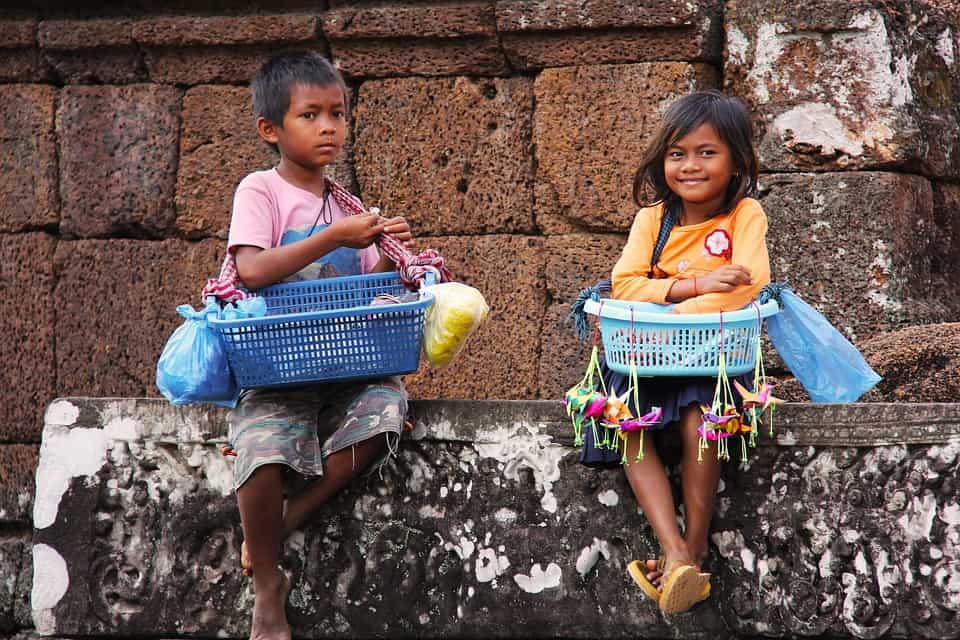
The language of Cambodia is Khmer. There is a sizeable Vietnamese speaking population and a few minority languages spoken among the very few tribal ethnic minorities in the country.
While Cambodia has a very bad reputation within ASEAN for its English skills, this is not representative of the country most digital nomads will experience. In Siem Reap, Phnom Penh, Kampot, and Kep – there are plenty of local English speakers with a high degree of fluency in most industries you will encounter.
Despite our length of stay in Cambodia – we barely know any words in Khmer. This reflects the fact that we never needed the language and were never really exposed to it either.
This is not to say that learning Khmer is time wasted. It’s just not essential for digital nomads making brief forays into the country.
Internet in Cambodia
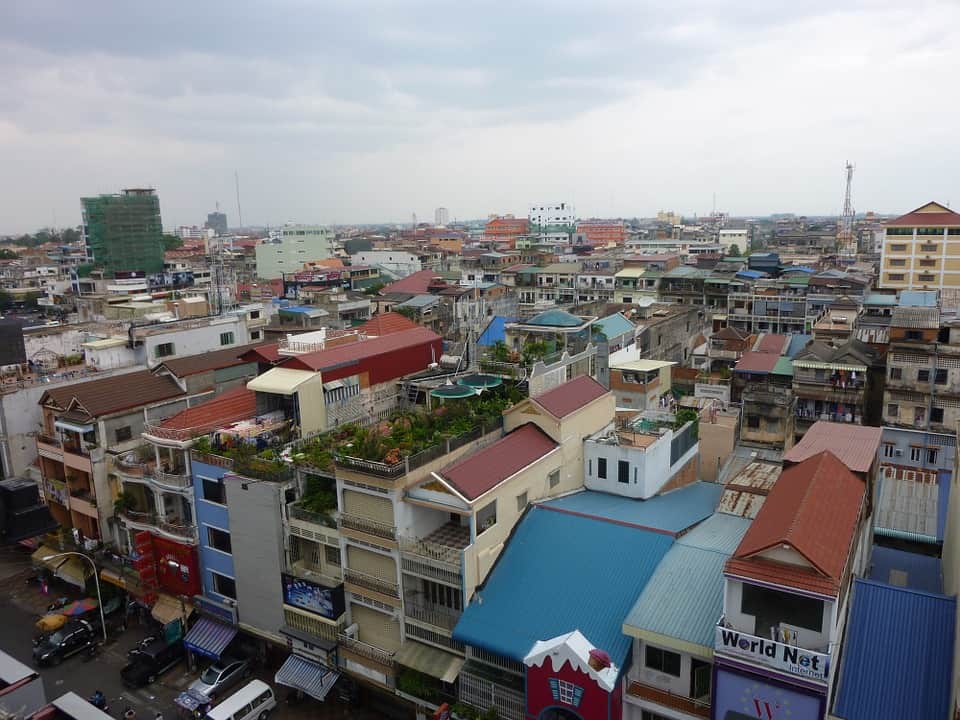
Cambodia’s telecoms environment is nuts. Unlike almost every country on earth where the government goes through a bidding process (and often has a state operator to consider too). Cambodia went “get on with it” and gave a telecoms license to everyone who asked for one.
This was a terrible idea for businesses in Cambodia’s telecoms sector but brilliant for customers. It left Cambodia with an excellent set of telecoms infrastructure and some of the lowest call costs in the world.
Home internet is very reliable and reasonably fast (20 MB is about standard). However, it’s worth noting that electricity is nowhere near as reliable, you’ll want a generator for electricity or cellular internet as a backup if you’re working to deadlines.
It’s worth noting that this means Cambodia is not ideal for the online English teacher as breaks in service can swiftly cause these folks a ton of problems.
Rental accommodation may or may not come with Wi-Fi, though it is available for free in most hotels and hostels as well as nearly every coffee shop and café in the land. If you need to sign up for your own connection expect to pay a deposit for the router and to sign a 1-year contract.
Money In Cambodia
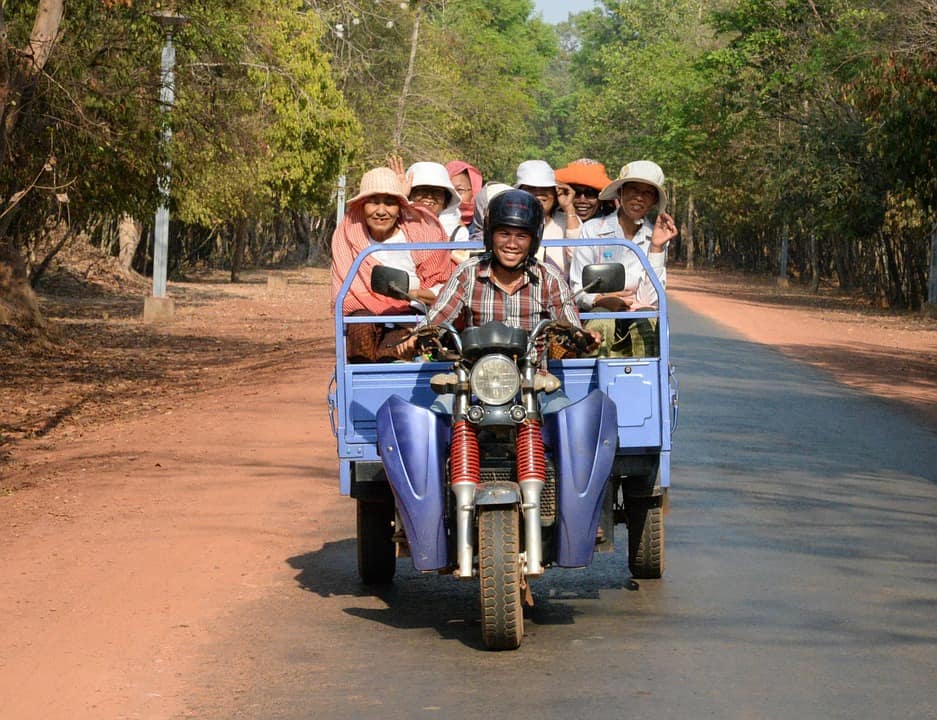
The official currency of Cambodia is the Cambodian Riel. In practice, nobody uses the Riel for anything but change in big cities. The US Dollar is the currency of choice in Cambodia. ATMs throughout the country dispense dollars and not Riel.
The Riel is pegged to the dollar and there are roughly 4000 Riel to the US dollar.
ATMs are generally available in most big cities and are reasonably easy to find. However, they’re not as common as they are in places like Thailand and you may need to go a mile or two to find one. In rural Cambodia – they’re very rare indeed, make sure to carry cash if you go out into the sticks.
You can open a Cambodian bank account if you have an ordinary visa with at least 6 months validity on it. You can’t open one on a tourist visa.
However, as Cambodia is a money-laundering haven – getting bank transfers into Cambodia is a real pain and require the use of an American clearing bank as an intermediary. You can also set up PayPal to pay out money in Cambodia but not to receive it. As a result, we tended to use Western Union to receive cash while we were there. Our Cambodian account still has the same $50 in it that was there when we opened it and nothing more.
Cambodian pricing is generally among the cheapest in the region. You will get better deals in stores than in markets unless you have an idea what local pricing should be or you can read the numbers in Khmer script which act as price tags on all market items (hint: get some Riel and you can match the numbers up without learning them).
Electronics are cheap and generally work fine though expect no real warranty from most places in Cambodia. This can make travel to Malaysia (which is just as cheap) appealing for large purchases. Though, we bought 2 PCs, a DSLR and a bunch of other hardware in Cambodia and had no problems with it.
Forget paying by credit or debit card in most businesses. In those rare few (big brand stores, shopping malls and 5-star hotels) that do accept cards expect to pay a surcharge for using your credit card. 3% is about the standard and that’s enough to make it a better idea to pay in cash.
Cambodia also has its own money transfer program called Mint. This allows money to be sent from your mobile phone to other people in Cambodia. It’s the cheapest form of money transfer in the country and is just as fast and easy as Western Union.
Finding Accommodation For Digital Nomads In Cambodia
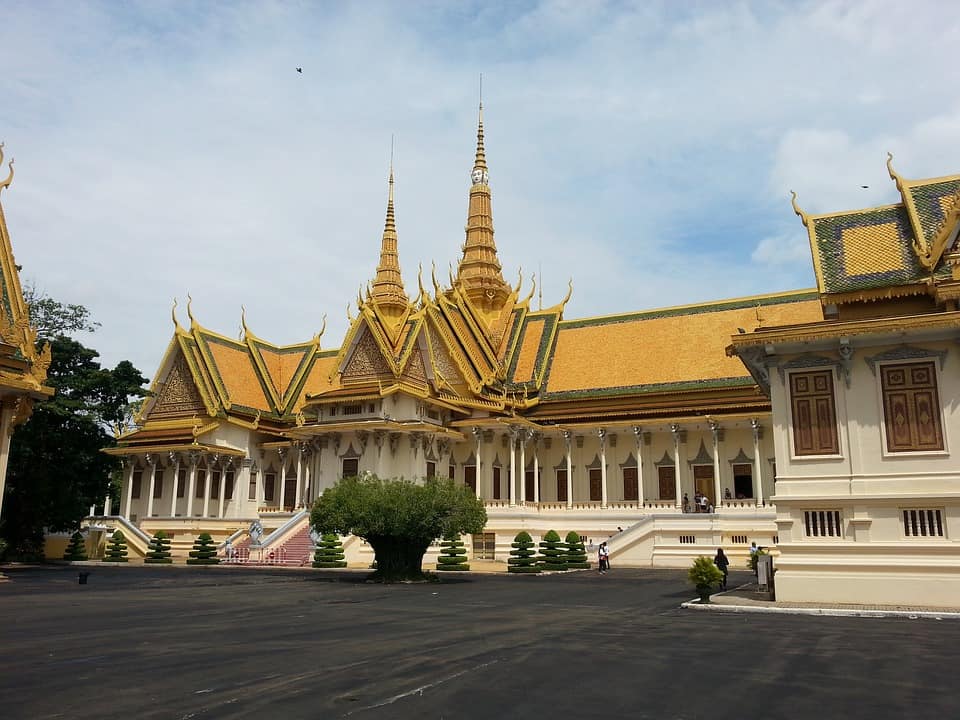
If you’ve become used to incredibly nice accommodation for the price of a postage stamp in Thailand then Cambodia can come as something of a nasty shock for the uninitiated.
There is something of a shortage of housing in the major cities (excluding Battambang) and thus rents for “Western-standard” properties are much higher than in the neighboring countries of Thailand and Vietnam.
You can find accommodation from as little as $50 but we wouldn’t recommend it. For that, you’re likely to get bare concrete walls and floors, a fan but no a/c, a squat toilet, and a barely functioning shower and no, there won’t be any Wi-Fi unless you arrange it.
$150 will get you something marginally less grim and sharing a house can get you something quite a bit nicer if you don’t mind the housemates.
If you want something “of a Western standard”, however, expect to pay $500+. Our one-bedroom apartment in Siem Reap was $800/month plus bills and plus cleaner. A three-bedroom house in Phnom Penh in a not particularly awesome neighborhood cost about the same.
It is worth noting that burglary is very common in Cambodia. Houses are particularly vulnerable to theft. If you choose to live in a house, lock everything up, all the time. If you leave a room – even for a minute to go to the bathroom – make sure all windows and doors to the outside world are locked.
This is why we paid a huge premium for a secure apartment block. We could leave the door open without worrying about thieves.
Almost all Khmer long-term apartment and homes expect you to provide your own bedding. This can be bought reasonably cheaply from malls and markets. If you’re staying in a hotel or a hostel it will be provided.
Security deposits are normally refunded at the end of the stay, but this isn’t always the case. We found that while most places insist on a two-month deposit, you can insist on only paying a month. This worked in each of the 5 places we’ve rented in Cambodia. Why give a landlord your money when you can keep it?
It’s worth noting that in Siem Reap – hotel rooms can often be had for next to nothing, particularly in the offseason and you may be able to get free breakfast as part of the deal. As with Thailand, AirBnB in Cambodia is not great value and you can do better by just turning up and looking around.
Electricity is normally charged at the meter rate by most landlords but do check before signing a contract. Electricity is a major expense in Cambodia as the country has to buy all its power from Vietnam and Thailand and does not generate its own. Our bill was often $300+ per month running a single A/C unit, a couple of laptops, a fridge/freezer, and a fan.
Co-Working Spaces In Cambodia For Digital Nomads

We can quite understand why people think that Cambodia would be short of co-working spaces but, in fact, there are plenty in Siem Reap and Phnom Penh where they compete against each other to give some of the best deals in the region.
We like the fact that the owners are often concerned with social responsibility and co-working in Cambodia can be a great way to give back to the community. However, if like us, you’re paying for enough space at home – there’s probably no need to go and sit in fairly cramped desks when you could be better spread out at home.
Typical monthly charges are $120+ with higher rates for days or weeks. You can often wangle a free day’s trial of a space before committing to paying any money.
They may (or may not) throw in some coffee/tea or even soft drinks for the fee and it’s worth asking before you sign a contract with a co-working space. They may also provide lockers for people on monthly contracts.
We would point out, however, that before you start spending money on co-working – Cambodia has a superb café culture. Wi-Fi is widely available and 100% free and nobody minds you sitting there and working over cheap coffee except in the busiest tourist spots.
You only need to spend money on co-working if you want to. We prefer not to and like to get our social life in other places than an office.
There is little to no co-working outside of the two big destinations in Cambodia though. There’s really no demand for it.
Food And Drink In Cambodia
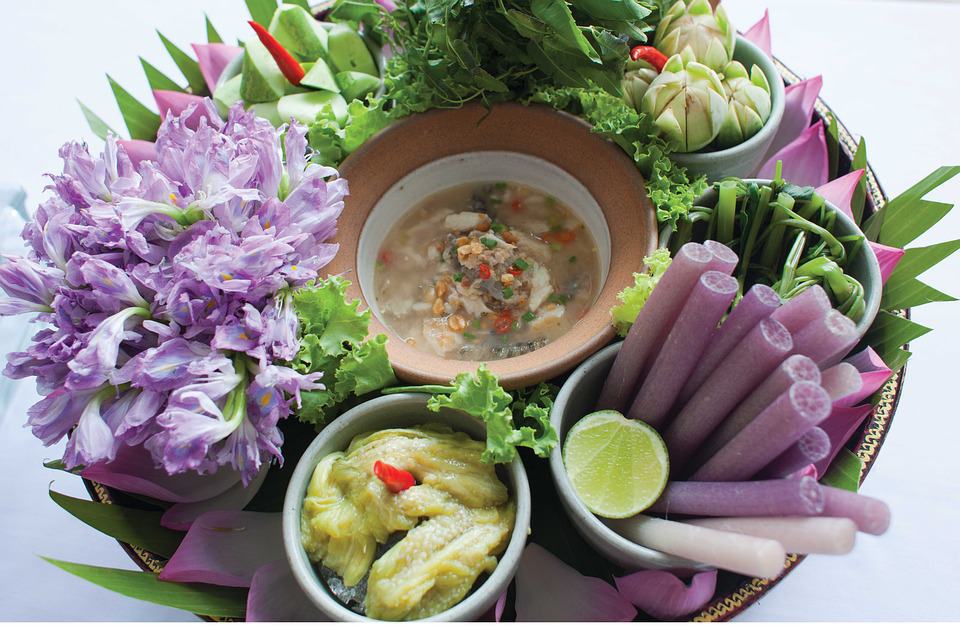
We love Cambodia for food and drink. It is fair to say that Cambodian food is not as popular or as varied as Vietnamese, Thai or even Burmese food but who cares? Cambodia has an endless array of international options from every corner of the globe and it’s all cheap.
Street food is not great but once you start eating in cafes – you quickly realize that you don’t need to be rich to eat a great meal every day. In fact, even if you eat in places where rich people would normally eat – you won’t break the bank either. We can think of several fine dining places in Phnom Penh and Siem Reap where you’d struggle to spend $20 a head unless you wanted to get very drunk…
A typical café or restaurant meal starts at about $2 and goes up from there. If you find food for less than that it will be of dubious quality, but many people are quite happy to hoover it up anyway.
We love eating out in Cambodia and we think it’s one of the biggest advantages to the country. Sure, you can’t eat at Raffles every day, but we don’t know anyone who couldn’t eat there at some point or another. You’ll pay less for a champagne brunch in Raffles, Siem Reap than you would for a couple of cocktails in Singapore.
Grocery items are a mixed bag but mostly they’re cheaper than in neighboring Thailand but if you want to buy food from markets – learn the local numbering system or you may end up paying “barang prices” for stuff. (Barang is the Khmer word for foreigner though it literally means “French man”).
Watch out in supermarkets, though, they’re not good at sticking to sell-by dates and some products may be well and truly rancid and still sat on a shelf. Corner stores are very basic compared to Thailand or Vietnam and you won’t find much in them other than potato chips and warm cans of Coke.
Imported food products are not available consistently and if you find something you love, you may want to stock up on it because it may be a while before you see it again. However, they are reasonably inexpensive and don’t cost a huge amount more than they do at home. This is a big difference to Thailand where imported goods are much more expensive.
If you like a drink, then Cambodia is heaven. Beer can be had from 50 cents a glass or can and even imported beers can be had for less than $3 in a bar. Wine and spirits are free of the heavy-duty imposed on them in the rest of the region too and you can drink pretty much anything without a huge bill at the end of the night.
Cambodia may have alcohol laws but if it does, nobody really obeys them. This is pretty much true of nearly every law in Cambodia and therefore it’s not worth worrying about.
Safety And Security For Digital Nomads In Cambodia
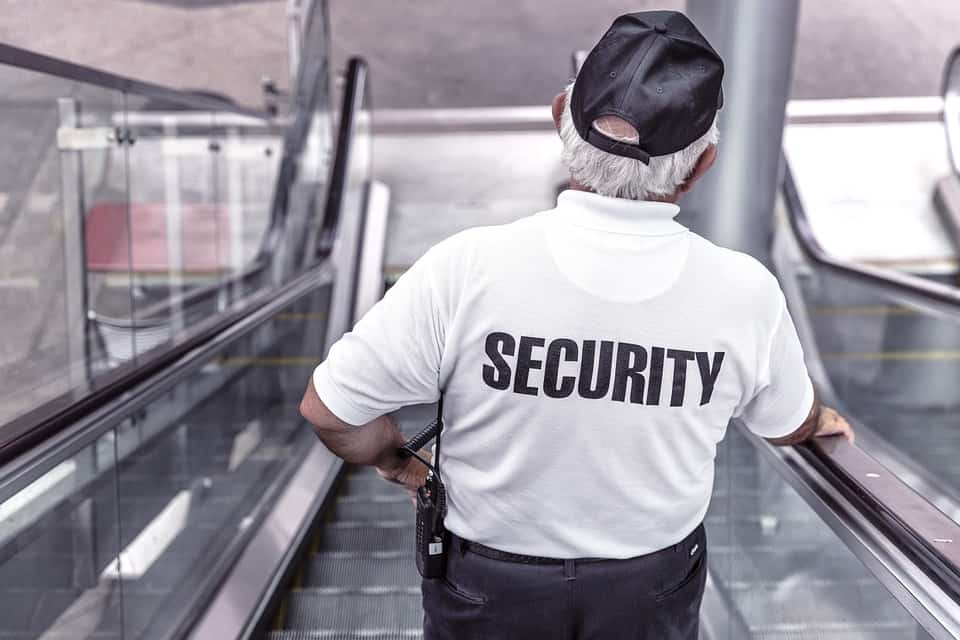
Cambodia is relatively safe, but it is not as safe as Thailand. That means common sense is important if you want to leave the country unscathed.
We lost a Kindle when it was ripped from my hand in Phnom Penh by a passing motorcycle thieving gang. That’s the worst thing that happened to us, but we know of several foreigners who’ve been mugged and burgled and in a couple of cases, they’ve also been assaulted.
Single women will be happy to hear that sexual assault of tourists is rare and is most likely to occur when Westerners party together and alcohol is a major contributing factor. However, no woman should take a moto-taxi late at night as this is a recipe for trouble.
Street crime is normally limited to snatch and grab theft. Try to ensure that whatever you carry in your hands is kept on the opposite side of your body to the road. If you wear a shoulder bag of any description, again keep it on the opposite side of your body to the road.
If someone does snatch something from you. Let it go. They are likely to become violent if caught and they may be armed. However, do feel free to point and shout “jao” (the Cambodia word for thief). The locals will be delighted to deal out a little mob justice to thieves. They are on the receiving end of theft far more often than tourists.
In bars, either pay your tab or as you go or make sure that you check every slip that goes into the pot in front of you. Its less likely that the bar will cheat you in Cambodia than in Thailand but that’s not to say that it never happens, either.
ATM skimming is rare but not unheard of. The best rule for ATMs is: always use the same one, always pick one in a bank or a mall under a security camera and make sure to check the slot and keypad for any sign of interference before entering your PIN.
Tuk-tuk drivers are generally friendly and open to good-natured haggling. Don’t be a tight-arse, learn what the going rate is for a journey and pay that. However, don’t feel obliged to pay $20 for a trip across town either. If negotiations aren’t going your way, just move on – there’s no shortage of drivers looking for customers in Cambodia.
Do not travel alone on dark roads late at night, this includes places that may be safe during the day. Take a tuk-tuk or a taxi home if you’re drunk. The prime time for muggings is once the sun goes down and drunk tourists are staggering about all over the city.
If you are mugged do not resist. Hand over everything you have and don’t argue. There is nothing you own that is irreplaceable except your life.
Khmer folks are generally, friendly, honest and kind and as long as you are calm and kind that’s the way they tend to stay too. It’s hard to think of any group of people on earth that’s as easy to warm to as Cambodian people. Use your common sense and your visit to Cambodia will be enormous fun with no nasty surprises.
Digital nomads should consider insurance for any essential gear during their time in Cambodia. Replacing cameras and laptops can be an expensive business.
Note: Building security guards are often completely worthless in Cambodia. The poor guy is normally working a 2nd or 3rd job as a security guard, so as soon as no-one is looking, he’ll be fast asleep and nothing, especially not burglars, will wake him up.
Clothing And Footwear In Cambodia

You can’t get cheaper than clothing and footwear in Cambodia. We used to know a Vietnamese girl who would visit the markets of Phnom Penh on the weekends and buy up jeans (that were made in Vietnam) to take back to sell in Saigon. It paid for her party lifestyle and ensure she never needed a full-time job at home.
Sadly, Western sizes are often too big for Khmer businesses to cater for. Large shoes, in particular, are very hard to find in Cambodia – I would have to visit Bangkok to get shoes while based in Cambodia. It is possible to have a cobbler make you shoes to fit but while this is inexpensive, the styles are very much stuck in a bygone era.
Khmer tailors are not great. If you want super suits, go to Hong Kong or Bangkok. We’d only recommend their services in an emergency or if you’re on a very tight budget.
Online shopping is poor in Cambodia and while Phnom Penh has a reasonable range of stores, the rest of the country does not.
Health Care In Cambodia For Digital Nomads

There is good news and bad news when it comes to digital nomads looking to take care of their health in Cambodia.
The good news. Dentistry in Cambodia is incredible. It is both excellent and cheap. Something that you rarely find in life. If you want to get fillings, root canals, or whatever, there’s nowhere better to get work done.
The bad news. All other medical services in Cambodia are bad. Phnom Penh has a couple of “international options” which aren’t great but will do in an emergency, the rest of the country has nothing you’d want to rely on.
We strongly recommend that if you get seriously sick in Cambodia that you flee to Thailand, Singapore or Malaysia and get treated there. In a real emergency, even Vietnam is much better than Cambodia for treatment.
If you do elect to use healthcare in Cambodia, you’ll need to pay for it. We’ve looked at health insurance and travel insurance here. You need to know the difference clearly before you buy the wrong product. It’s worth noting that they may refuse to treat you if you cannot demonstrate the ability to pay.
Illegal Drugs In Cambodia
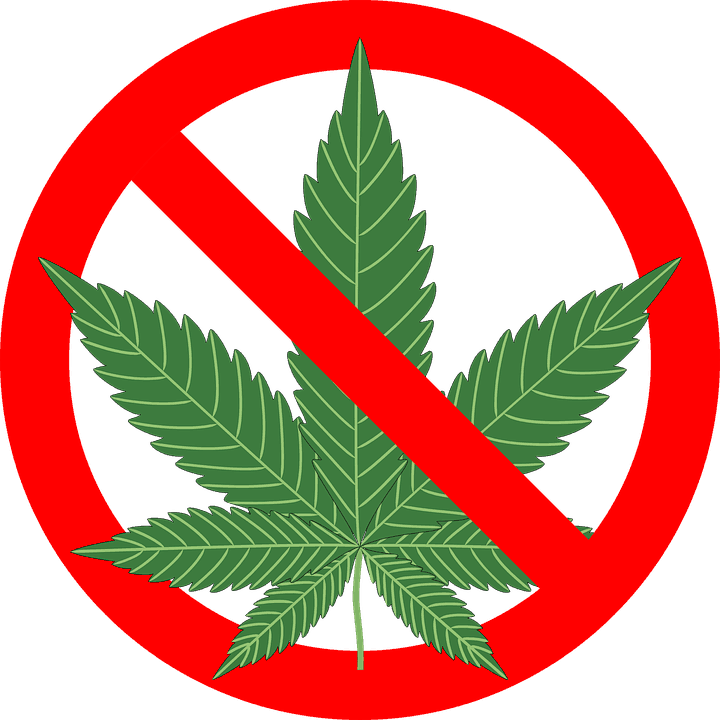
Cambodian drug laws are just as Draconian as those in the rest of Southeast Asia. However, you’d be hard pushed to believe this after a policeman tries to sell you heroin on the riverside in Phnom Penh.
Yes, this happened to us and on a near-daily basis as well.
This isn’t to say that drug laws are never enforced in Cambodia. They are but only at random. Sometimes a $20 bribe will make the law leave you alone but sometimes it will be $2,000 or more.
If you are foolish enough to fail to pay a bribe to get out of jail in the event of drugs charges… you can look forward to a severe jail sentence in some of the world’s worst prisons.
However, it’s worth noting that many prescription drugs (such as Codeine or Valium) do not require a prescription in Cambodia and may be legally purchased in any pharmacy.
There is also a legal exemption for Khmer kitchens to carry marijuana and “happy pizza” places are completely legal. Smoking that marijuana is not legal, though it doesn’t seem to stop anybody.
We echo our advice that getting involved with drugs in South East Asia is very risky but if you must do it, Cambodia’s the least risky place in the region.
Dating In Cambodia For Digital Nomads

We’ve found that in Cambodia the most dating for Westerners tends to be between other Westerners. With short-term hookups between backpackers and tourists the most likely eventuality.
Khmer girls are much more conservative than girls in other countries in the region and if you ignore the fleshpots of Phnom Penh, they are reluctant to date foreigners that they perceive as flighty and unlikely to hang around.
If, however, you establish yourself over a period of time, you’ll find that landing a good girl in Cambodia is easier than elsewhere.
Khmer men may be delighted to date a Western woman, but cultural issues often come to the fore and, in particular, violence in relationships is not uncommon in Cambodia.
As with much of Southeast Asia, the most common long-term relationship with locals tends to be older Western men with “ladies of negotiable affection”. In our experience this is not a recipe for happiness and these relationships often end unpleasantly for all concerned.
If you wouldn’t date a prostitute at home, why would you think it would be a good idea somewhere else?
English skills are lacking outside of the big cities in Cambodia. You may need to learn Khmer if you want to land a Cambodian bride or husband.
We don’t know of any digital nomads who’ve married a Khmer, but we do know a couple of expats who have. Cambodians are often a bit reluctant to travel the rest of the world and it’s worth noting, it’s very hard for someone with a Khmer passport to travel outside of South East Asia anyway.
General Shopping In Cambodia For Digital Nomads

Shopping in Phnom Penh is, nearly, equivalent to shopping in other big cities in the region though there’s a lot of fake products and next to no quality control.
It’s a lot more limited in other cities in Cambodia and you may find that you need to travel to buy specialist items.
You can order products for delivery from overseas but be warned, if customs seize them for excise duty, you may have to travel a long distance to collect and pay an obscene fee far in excess of the value of the goods.
In short, we’d go to Saigon or Bangkok (depending on which side of the country you are on) if you want a big shopping spree.
One shopping highlight, however, is book shops – Cambodia’s new and secondhand bookshops are awesome. We have no idea why, but they are.
Religion In Cambodia
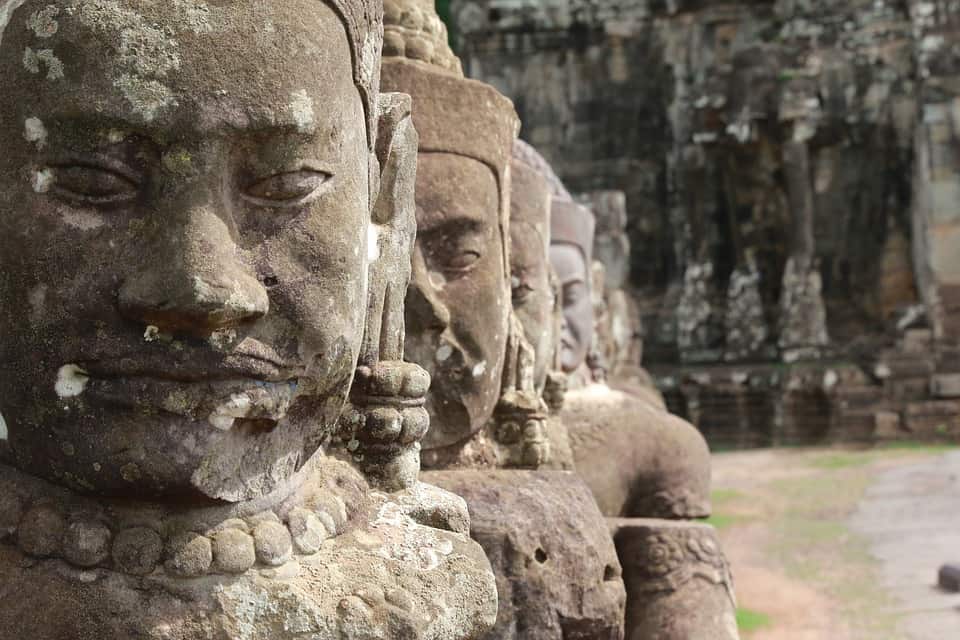
Almost all Khmer are Buddhist. There is a sizeable Muslim population throughout the country which tends to keep itself to itself and does not intermingle with the majority.
There is complete freedom of religion in Cambodia and you can find representatives of all major and most minor faiths if you look hard enough. Religious digital nomads will have no problem finding a congregation to join.
It’s worth knowing that Cambodia’s recent history has taken its toll on its religion. Pol Pot and his psychopathic cronies tried to eliminate the clergy and thus, Khmer Buddhism is almost a brand new interpretation of the faith. It is one that is still evolving too, so please don’t expect to find “textbook” approaches to Buddhism in the country, life’s not like that.
The biggest celebration of the year comes at Khmer New Year (Songkran). It is worth knowing that though this shares the same date on the calendar as the Thai festival, the Khmer version is much more traditional.
Khmer New Year falls in March/April time and not on January 1st.
Tiny splashes of water are offered with respect in Cambodia during this festival. No-one runs around with water pistols or buckets of iced water. If you want a Buddhist water fight, you should head to Thailand for the New Year.
It is a good rule of thumb in all countries not to try and inflict your religious or political beliefs on the locals. By all means, ask questions to seek to understand the people around you, but don’t start preaching and remember – it’s rude to take pictures of monks without their permission.
General Thoughts On Cambodia For Digital Nomads
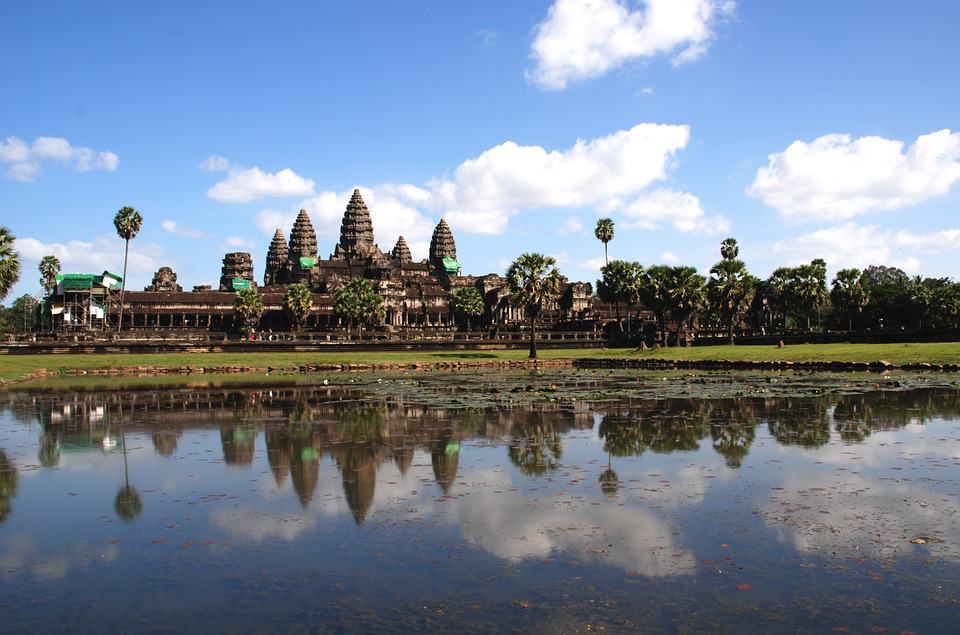
We’re not going to pretend that Cambodia doesn’t present challenges to digital nomads. The biggest of which is the semi-regular power outages that can strike at any time. However, what we will say is that Cambodia is worth the effort anyway.
This is Southeast Asia as it once was. Not the busy, polluted cities but a gentle people managing life at a gentle pace. You may not be able to escape the poverty of the place, but neither can you escape the generosity of the people who bravely deal with everything that life has to throw at them.
It might not be the ideal first-time destination for some – the lack of polish can be quite intimidating at first, but we’d like to see every digital nomad spend time in Cambodia.
Our love for the place only grows each time we’re there. The expat community is much more accessible than in other countries in the region and that makes it easy to find friends from “back home” and the locals are extremely friendly too.
If you want your digital nomad life to be about freedom, discovery, and adventure; you have to visit Cambodia. We hope to see you there.
